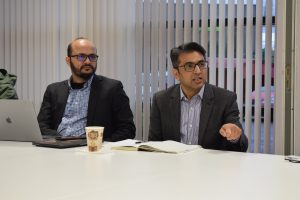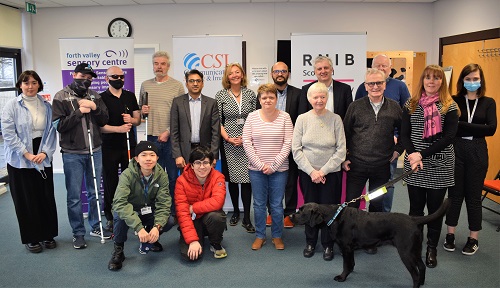Charities & Support Groups
Robot designed for VI’s named “Pepper” is tested
Robot designed for VI’s named “Pepper” is tested
Blind and partially sighted people got a glimpse of the future today when staff and research students from the University of Glasgow demonstrated ‘Pepper’ a robot specially created to guide people with sight loss around buildings.
 The event took place today at the Forth Valley Sensory Centre in Camelon.
The event took place today at the Forth Valley Sensory Centre in Camelon.
Designed by the Communication, Sensing and Imaging (CSI) Research Group as part of a £50m investment in next generation infrastructure development at the university, Pepper is able to ‘learn’ the layout of a building, avoid obstacles and even recognise different objects so they can guide a blind person to exactly what they need.
As well as Pepper, the CSI team, led by Dr Wasim Ahmad, also demonstrated a new ‘smart cane’ which helps blind and partially sighted people identify objects using special sensors and vibration technology to alert them to possible obstructions, including other people.
Both technologies were demonstrated by their respective research students, Jingyan Wang (Pepper) and Liyuan Qi (Smart cane). Dr Wasim Ahmad and Dr Qammer Abbasi also led a discussion on assistive technology and asked about other themes it might be useful to develop.
Dr Wasim Ahmad explained: “Accessibility is a huge part of today’s society. Technology has progressed at a phenomenal pace in the last few decades but accessibility has not always developed alongside it. One of the things we are doing as part of this work is finding out what the needs of people with sensory conditions are and looking at potential solutions to the challenges they are faced with on a daily basis.”
The CSI Research Group is led by Professor Muhammad Ali Imran who is also a Dean of University of Glasgow campus in China.

Forth Valley Sensory Centre Chief Executive, Jacquie Winning MBE added: “Mobility is a big issue for the blind and partially sighted community. We saw during the pandemic huge issues with people struggling to social distance and stores being fearful of assisting blind people to shop. Pepper is a wonderful solution to that problem and we are delighted Dr Abbasi and his team were able to bring this innovative, creative robot to Forth Valley.
“Similarly, the white cane is a symbol of blindness that many recognise but sadly, lots of people don’t respect. Pavement parking, street furniture or simply walking along staring at our phones, all result in bumps and accidents for blind people who are subject to a mental and physical assault course whenever they leave home.
“People describe the white cane as an obstacle finder, the user must hit the object they need to avoid before they can move around it. This can lead to confrontation, with Centre Users having been verbally abused for bumping into vehicles parked on the pavement. We hope that full trials of both these technologies will prove fruitful and be a great benefit to the blind and partially sighted community.”
The demonstration event was supported by RNIB Scotland and its Haggeye youth forum for blind and partially sighted young people. Several Haggeye members were able to come along and try the different devices
Forth Valley Sensory Centre user Kyle Somerville (20) from Falkirk who is blind, tried out Pepper and thought the concept really had potential.
Kyle said: “Pepper is really cool. He was very easy to follow and the humanoid design is very interesting. I don’t know if everyone will like it and I can imagine the first ones attracting a lot of attention from the public but it is an amazing concept. I’ve heard about ideas for robot Guide Dogs before but to actually meet a device like that was brilliant. It would be very useful when visiting a new or different place. The future is definitely technology.”
James Adams, director of national sight loss charity RNIB Scotland, commented: “Technological innovations have been of huge benefit to people with sight loss. RNIB has been at the leading edge of this through our partnerships with Amazon and other global companies, helping to develop assistive or accessible technology.
“Alongside this, we have campaigned for years to help all disabled people and others by asking for pavement parking to be banned and for street furniture, notice boards, café seating and other obstacles to be better regulated. These new devices demonstrated today solve very real world problems, and we look forward to hearing more as they continue their development.”
It is hoped that following the success of this demonstration that the CSI Research Group will be able to demonstrate their work to assist the deaf community too. Forth Valley Sensory Centre is always keen to explore new ways to increase equality and accessibility for the sensory community. You can find out more about the CSI Research Group on the Glasgow University website here www.gla.ac.uk/research/az/csi/ Information on Haggeye and RNIB here www.rnib.org.uk/scotland/youth-engagement and Forth Valley Sensory Centre at www.forthvalleysensorycentre.org or follow @FVSensoryCentre.

The Forth Valley Sensory Centre has been supporting people in Forth Valley with sensory impairment and their families for over 15 years. The Centre acts as a Community Hub, offering support, advice, practical help and social opportunities.
The overall objective of Forth Valley Sensory Centre, is to help people who have a sensory impairment live as independently as possible. The Centre is owned and run by Forth Valley Sensory Centre Trust, which is a partnership of RNIB Scotland, Action on Hearing Loss, NHS Forth Valley, Falkirk Council and Stirling Council.























